Find a COVID-19 vaccine or booster:
COVID-19 vaccines are widely available across the country. Search vaccines.gov, text your ZIP code to 438829, or call 1-800-232-0233 to find locations near you. More information on COVID vaccines for people with disabilities can be found here.
CDC offers clear information in easy to read formats, communications tools in a wide variety of languages, and entire toolkits in American Sign Language (ASL).
General Resources
- Coronavirus.gov
- Centers for Disease Control and Prevention (CDC)
- World Health Organization (WHO)
- Videos about COVID-19 in ASL from the CDC
- Administration on Community Living (ACL)
- Centers for Medicare and Medicaid Services (CMS)
- American Association on Health and Disability (AAHD)
- Emergency and Disaster Response: ADA Lessons Learned
- Accessibility at Drive-Thru Medical Sites
- Suicide Prevention Lifeline
- Support Your Local Food Bank
- Addressing the Needs of Medicaid Populations During the COVID-19 Pandemic (Center for Health Care Strategies)
- COVID-19, Unemployment Insurance, and People with Disabilities (from the Arc)
Toolkits from RespectAbility
- Ensuring Virtual Events Are Accessible for All: Steps to take before, during and after an event to ensure it is as accessible as possible for all people, including people with disabilities
- Virtual Education & Students With Disabilities Resource Guide: Supporting Student Success in the Time of COVID-19 and Beyond (Last Updated January 2022)
News about COVID-19
The Disability Community Reacts to New CDC Masking Guidance
March 18, 2022
The Centers for Disease Control and Prevention (CDC) released new guidance on February 25th that reversed masking guidelines in areas with low rates of hospitalization, regardless of case numbers or whether individuals are vaccinated and boosted. In a letter to CDC Director Rochelle Walensky, advocates from more than one hundred national, state and local organizations expressed their deep concerns about the new guidance and its impact on disabled and marginalized populations. At the time of this publication, Director Walensky has not provided a response to the concerns stated in the joint advocacy letter.
Vermont COVID Recovery Plan Prioritizes People with Disabilities
February 25, 2022
Vermont recently released their 2021 recovery plan, and it contains good news for Vermonters with disabilities. As part of the Coronavirus Aid, Relief, and Economic Security (CARES) Act passed by Congress last year, states are rolling out extensive plans about how they will spend federal funds. The Green Mountain State has $478.6 million dollars allocated to drive economic recovery efforts under Gov. Phil Scott. Some of the announced priorities are making homeless shelters ADA compliant, creating a mobile mental health crisis intervention program, providing broadband internet access to people with disabilities, and preventing COVID infections at Adult Day Services.
COVID-19 Updates for People with Disabilities from the Biden-Harris Administration
February 24, 2022
Today, the Biden-Harris Administration released a fact sheet on their work addressing the intersection of the COVID-19 pandemic and the disability community. Here is some of the key information they shared.
Disability Group Pushes Government to Better Understand COVID’s Impact on Students with Disabilities
March 23, 2021
As the nation continues to grapple with the lessons learned from one year of lockdown, virtual education and the other results of the COVID-19 pandemic, the U.S. Department of Education solicited new ideas to support the National Assessment of Educational Progress (NAEP) 2021 School Survey. In response to this opportunity, the RespectAbility team rapidly solicited insights from board members, partner organizations and self-advocates to push for the collection of better disability data as part of the NAEP.
New COVID Relief – What Does It Mean for People with Disabilities?
December 22, 2020
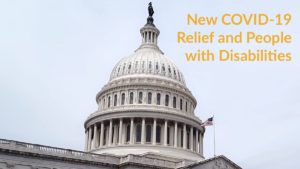 After months of partisan gridlock and inaction, the Congress finally approved a massive coronavirus relief bill last night and sent it to the President’s desk. This mammoth bill, totaling more than 5,000 pages of legislative language and with more than $900 billion in spending, becomes law at the same time as the United States crosses the grim milestone of more than 316,000 dead because of the pandemic.
After months of partisan gridlock and inaction, the Congress finally approved a massive coronavirus relief bill last night and sent it to the President’s desk. This mammoth bill, totaling more than 5,000 pages of legislative language and with more than $900 billion in spending, becomes law at the same time as the United States crosses the grim milestone of more than 316,000 dead because of the pandemic.
RespectAbility urges people with underlying health conditions to avoid COVID-19 by using food pickup or delivery
July 21, 2020
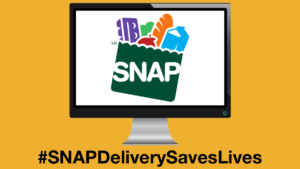
According to the CDC, 90 percent of COVID-19 hospitalizations are people with underlying conditions. Moreover, it is very hard for people who are blind to see who does or does not have a mask on. People who use wheelchairs cannot simply jump out of the way when someone comes near them without a mask. Thus, in places where people are not wearing masks or practicing full social distancing, RespectAbility – a national disability nonprofit – is encouraging people with disabilities to use food pickup or delivery so they can stay healthy.
“People with disabilities should not have to choose between starving and catching a deadly disease,” said Jennifer Laszlo Mizrahi, president of RespectAbility. Thankfully, due to urging from RespectAbility and other groups and leaders, 43 states now have options to ensure that people with disabilities and other beneficiaries of the Supplemental Nutrition Assistance Program (SNAP), also called food stamps, can use their benefits to pay for online grocery deliveries. Further, 3 more states await final approval from the U.S. Department of Agriculture (USDA). Only 4 states have yet to announce any action.
Massive Victory for People with Disabilities who Use SNAP (Food Stamps)
May 22, 2020

“In less than six weeks, amidst an unprecedented situation, USDA has expanded SNAP online purchasing to 36 states and the District of Columbia – nearly three-quarters of the states, covering 90% of SNAP households.”
On Wednesday, the United States Department of Agriculture (USDA) announced that 90% of Supplemental Nutrition Assistance Program (SNAP) households now will be able to safely access food during the COVID-19 pandemic. This is a major life-saving milestone achieved by the efforts of various disability advocacy groups, including the nonprofit RespectAbility.
COVID-19 Economic Benefits How-To Guide
May 19, 2020
 As more Americans with and without disabilities are caught up in the economic consequences of the COVID-19 pandemic, people are wondering where to find answers to life-or-death questions.
As more Americans with and without disabilities are caught up in the economic consequences of the COVID-19 pandemic, people are wondering where to find answers to life-or-death questions.
What do I do if I’m a person with a disability and lost my job because of COVID-19? You are not alone. A monthly report published by the University of New Hampshire’s Institute on Disability (UNH-IOD), shows that nearly one million working-age people with disabilities lost their jobs. That represents a 20 percent reduction of the number of workers with disabilities in our nation’s economy. There is a significant question whether those jobs will ever come back.
Hollywood Professionals with Disabilities Help Millions Gain Safe Access to Food
May 14, 2020
Online Ordering and Food Delivery Urgent for 11 Million People with Disabilities on SNAP
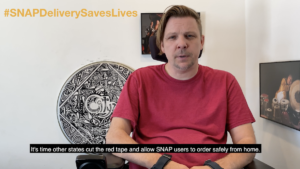 A group of entertainment professionals, in partnership with the disability advocacy nonprofit RespectAbility, have created a campaign to ensure that people who use Supplemental Nutrition Assistance Program (SNAP) can do so through online delivery during the COVID-19 pandemic.
A group of entertainment professionals, in partnership with the disability advocacy nonprofit RespectAbility, have created a campaign to ensure that people who use Supplemental Nutrition Assistance Program (SNAP) can do so through online delivery during the COVID-19 pandemic.
A new video featuring those who use wheelchairs, are blind and are immunocompromised from all over the country urges governors and the USDA to cut the red tape and allow SNAP users to order safely from home.
Grassroots Campaign Urges Governors and USDA to Ensure 11 Million People with Disabilities Have Safe Access to Food
May 14, 2020
15 States Deny Access to Safe Food Options for People with Disabilities
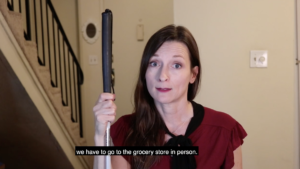 People with disabilities – including those who use wheelchairs, are blind and are immunocompromised – from all over the country created a video campaign to urge governors and the USDA to ensure that people who use Supplemental Nutrition Assistance Program (SNAP) can do so through online delivery during the COVID-19 pandemic.
People with disabilities – including those who use wheelchairs, are blind and are immunocompromised – from all over the country created a video campaign to urge governors and the USDA to ensure that people who use Supplemental Nutrition Assistance Program (SNAP) can do so through online delivery during the COVID-19 pandemic.
Nationwide, 11 million Americans with disabilities depend on SNAP, also called food stamps, to pay for groceries. Fifteen states have yet to ensure their high-risk residents can receive online grocery deliveries through SNAP, leading to millions of people with and without disabilities risking exposure to COVID-19 or going hungry.
New Poll Shows 81% of Registered Voters Support Allowing SNAP Users to Order Groceries Online for Delivery Using Food Stamps
May 13, 2020
51% of Voters Want to Vote By Mail
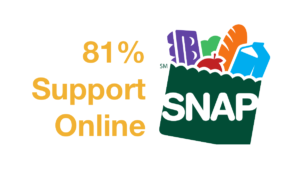 According to a new poll conducted by Democracy Corps on behalf of the Center for Voter Information, 81 percent of registered voters (84 percent of voters with disabilities) say they favor allowing people who use Supplemental Nutrition Assistance Program (SNAP), to be able to order and pay for groceries and delivery online, so they don’t have to go into stores.
According to a new poll conducted by Democracy Corps on behalf of the Center for Voter Information, 81 percent of registered voters (84 percent of voters with disabilities) say they favor allowing people who use Supplemental Nutrition Assistance Program (SNAP), to be able to order and pay for groceries and delivery online, so they don’t have to go into stores.
But 15 states have yet to ensure their high-risk residents can receive online grocery deliveries through SNAP (also known as food stamps), leading to millions of people with and without disabilities risking exposure to COVID-19 or going hungry. An additional 13 states have applied to the USDA and bureaucrats in Washington, D.C. so that people with disabilities can use their food stamps to deliver groceries. However, they are in wait mode – living in fear and in need of safe access to food.
“Ensuring people can use SNAP to order food online to receive via delivery does not cost the government any more money,” said RespectAbility President Jennifer Laszlo Mizrahi. “It is heartening to see that this polling data showing that 81 percent of voters support this initiative is nonpartisan, with both Democrats and Republicans in support.”
15 States Deny Access to Safe Food Options for People with Disabilities
May 12, 2020
New Poll Shows 81% Voters Support Allowing SNAP Users to Order Groceries Online for Delivery
 Fifteen states have yet to ensure their high-risk residents can receive online grocery deliveries through Supplemental Nutrition Assistance Program (SNAP), leading to millions of people with and without disabilities risking exposure to COVID-19 or going hungry.
Fifteen states have yet to ensure their high-risk residents can receive online grocery deliveries through Supplemental Nutrition Assistance Program (SNAP), leading to millions of people with and without disabilities risking exposure to COVID-19 or going hungry.
Nationwide, 11 million Americans with disabilities depend on SNAP, also called food stamps, to pay for groceries and provide for their families.
Since the start of the pandemic, 35 states have a taken a critical step to ensure that the people at the greatest risk from COVID-19 can safely order groceries online. In these states, beneficiaries who depend on SNAP to put food on the table can now order their groceries online and get it delivered to their homes.
However, 15 states have yet to act: Alaska, Illinois, Indiana, Kansas, Maine, Michigan, Mississippi, Montana, New Hampshire, North Dakota, Ohio, South Carolina, South Dakota, Utah and Virginia.
Yet, according to a new poll conducted by Democracy Corps on behalf of the Center for Voter Information, 81 percent of voters say they favor allowing people who use SNAP to be able to order and pay for groceries and delivery online, so they don’t have to go into stores.
12 Additional States Move to Enable People with Disabilities to Eat, Yet 19 States Still Deny Access to Safe Food Options
May 7, 2020
Act Now to Enable People Who Use SNAP (Food Stamps) to Get Food Delivered
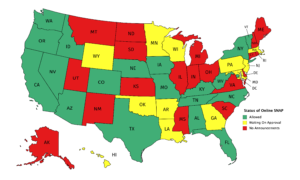 Since the start of the pandemic, 25 states have a taken a critical step to ensure that the people at the greatest risk from COVID-19 and who rely on Supplemental Nutrition Assistance Program (SNAP) benefits can safely order groceries online – with 12 of them starting the process in recent weeks. The disability nonprofit RespectAbility congratulates leaders in twelve states that are now in the process for applying for a waiver from the U.S. Department of Agriculture that would allow SNAP recipients to use their benefits for online grocery delivery via Walmart or Amazon.
Since the start of the pandemic, 25 states have a taken a critical step to ensure that the people at the greatest risk from COVID-19 and who rely on Supplemental Nutrition Assistance Program (SNAP) benefits can safely order groceries online – with 12 of them starting the process in recent weeks. The disability nonprofit RespectAbility congratulates leaders in twelve states that are now in the process for applying for a waiver from the U.S. Department of Agriculture that would allow SNAP recipients to use their benefits for online grocery delivery via Walmart or Amazon.
However, nineteen states have yet to act or publicly announce any plans to ensure their constituents can receive online grocery deliveries through SNAP. Instead, millions of people with and without disabilities have to risk exposure to COVID-19 or go hungry. States that have yet to act include: Alaska, Connecticut, Delaware, Indiana, Illinois, Kansas, Maine, Michigan, Mississippi, Montana, New Hampshire, New Mexico, North Dakota, Ohio, Rhode Island, South Carolina, South Dakota, Utah and Virginia.
As More States Enable People with Disabilities to Eat, Millions with Disabilities Still Forced to Choose Between Hunger & Contagion
May 1, 2020
In 16 states, people with disabilities now can use SNAP to eat safely while other states leave people with disabilities at risk
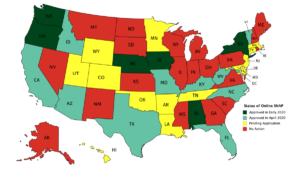 In 16 states, people with disabilities and other recipients of the Supplemental Nutrition Assistance Program (SNAP) no longer have to choose between risking exposure to COVID-19 or getting food from the grocery store. Thanks to an administrative change, millions of Americans now can access online grocery deliveries through Amazon Fresh and Walmart.
In 16 states, people with disabilities and other recipients of the Supplemental Nutrition Assistance Program (SNAP) no longer have to choose between risking exposure to COVID-19 or getting food from the grocery store. Thanks to an administrative change, millions of Americans now can access online grocery deliveries through Amazon Fresh and Walmart.
Because of the COVID-19 pandemic, a simple action like going to the grocery store to put food on the table means potentially risking exposure to the coronavirus. This is especially the case for those who are blind or use wheelchairs or other mobility devices for whom maintaining six feet of distance may be impossible. The answer for many American households has been to turn to online grocery deliveries. For many of the 11 million Americans with disabilities who rely on SNAP for their basic nutrition, however, that option has been unavailable, leaving them to shop in person despite the higher risk they face.
California Prioritizing Food Security for People with Disabilities
May 1, 2020
Californians with disabilities now can use SNAP to eat safely while other states leave people with disabilities at risk
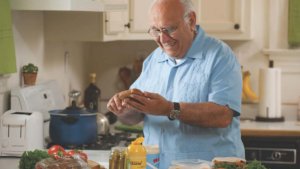 Californians with disabilities and other recipients of the Supplemental Nutrition Assistance Program (SNAP) no longer have to choose between risking exposure to COVID-19 or getting food from the grocery store.
Californians with disabilities and other recipients of the Supplemental Nutrition Assistance Program (SNAP) no longer have to choose between risking exposure to COVID-19 or getting food from the grocery store.
As of April 28, California’s SNAP program, CalFresh, covers online grocery delivery. This benefits approximately 1.1 million Californians with disabilities who depended on SNAP benefits.
Because of the COVID-19 pandemic, a simple action like going to the grocery store to put food on the table means potentially risking exposure to the coronavirus. This is especially the case for those who are blind or use wheelchairs or other mobility devices for whom maintaining six feet of distance may be impossible. The answer for many American households has been to turn to online grocery deliveries.
Blind Triplets Who Became Eagle Scouts Now Battling COVID-19
April 24, 2020
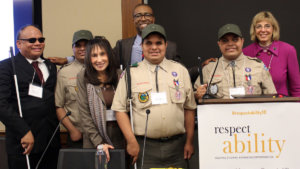 As the COVID-19 pandemic continues to disrupt everyday life for people around the world, three blind triplets have contracted the virus – showcasing the extra precautions people who are blind and have low vision must take during this time.
As the COVID-19 pandemic continues to disrupt everyday life for people around the world, three blind triplets have contracted the virus – showcasing the extra precautions people who are blind and have low vision must take during this time.
Nick, Steven and Leo were adopted by Ollie Cantos, who is a board member for RespectAbility and is also blind. The Cantos triplets were the first blind triplets to became Eagle Scouts, and their story went viral, being covered by ABC News and many local news outlets. Ollie, Nick, Steven and Leo also were featured speakers at RespectAbility’s 2018 Capitol Hill Summit.
Despite self-quarantining for more than a month after coming home from college, all three 20-year-old triplets contracted the virus because people they live with had to go in and out of the home. One of their roommates tracked in into the house without showing symptoms. The brothers, who had come from home college a month ago, were living in this house to avoid being in their dad’s home, where their grandmother, who is immunocompromised, lives. Leo has been hospitalized since Monday and Nick was admitted Thursday. Steven is able to remain quarantined at home. Ollie keeps the community updated through posts on his Facebook profile.
COVID-19 Economic Benefits How-To Guide
April 17, 2020
 As more Americans with and without disabilities are caught up in the economic consequences of the COVID-19 pandemic, people are wondering where to find answers to life-or-death questions. In this How-To Guide, the RespectAbility team has compiled clear information about several key Economic Benefits to see you through these challenging times.
As more Americans with and without disabilities are caught up in the economic consequences of the COVID-19 pandemic, people are wondering where to find answers to life-or-death questions. In this How-To Guide, the RespectAbility team has compiled clear information about several key Economic Benefits to see you through these challenging times.
This guide includes the latest information and online resources about three key topics: accessing your CARES Act payment, accessing food resources and understanding unemployment insurance.
RespectAbility Invites People with Disabilities to Share COVID-19 Experiences and Organize Online
April 15, 2020
CDC reports that approximately 90% of people hospitalized with COVID-19 have underlying conditions
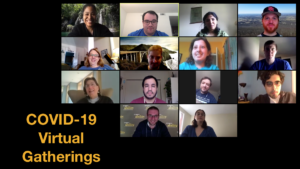 As the CDC reports that approximately 90% of people hospitalized with COVID-19 have underlying conditions, the nonprofit disability organization RespectAbility is inviting people with disabilities to share experiences and organize online.
As the CDC reports that approximately 90% of people hospitalized with COVID-19 have underlying conditions, the nonprofit disability organization RespectAbility is inviting people with disabilities to share experiences and organize online.
Said Jennifer Laszlo Mizrahi, president of RespectAbility, “People with disabilities are disproportionally impacted by both the health and economic consequences of the COVID-19 crisis. People with disabilities urgently need to be there for each other and to organize so leaders understand our lives and future are at stake.”
RespectAbility is inviting people with disabilities from across America to join in a series of Zoom gatherings. The purpose of the gatherings is for individuals to share experiences, brainstorm ideas, prioritize issues and bring solutions forward to decision makers and service providers. RespectAbility’s virtual events include separate sessions for people who are blind, use wheelchairs, are young adults with disabilities, have developmental disabilities, and for women with a variety of disabilities. Participants may choose one or more sessions to attend. Additional sessions will be added later.
LGBTQ+ People with Disabilities and the COVID-19 Crisis
April 14, 2020
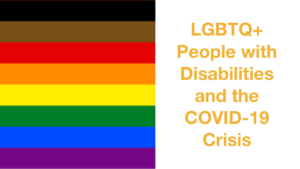 People with disabilities are at particularly high risk during the COVID-19 crisis. According to the CDC, approximately 90% of hospitalized patients had one or more underlying conditions. Millions of people with disabilities are unable to get food and medicine. And there are widespread fears in the community about medical rationing. Especially in a time of crisis like this, it is critically important that people with disabilities are accurately portrayed in film and television and that the public sees their lives as valuable.
People with disabilities are at particularly high risk during the COVID-19 crisis. According to the CDC, approximately 90% of hospitalized patients had one or more underlying conditions. Millions of people with disabilities are unable to get food and medicine. And there are widespread fears in the community about medical rationing. Especially in a time of crisis like this, it is critically important that people with disabilities are accurately portrayed in film and television and that the public sees their lives as valuable.
To address this, RespectAbility is hosting a new series of virtual workshops for people with disabilities in the entertainment industry. The first workshop will take place Wednesday evening and will feature a conversation with Ryan O’Connell. O’Connell, who is openly gay and has cerebral palsy, broke new ground for representation of LGBTQ+ people with disabilities with his Netflix series Special. Learn more and RSVP online.
Millions With Disabilities Cannot Get Food
April 10, 2020
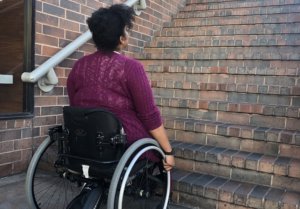 Millions of people with disabilities are unable to get food and medicine during the national pandemic emergency, according to the nonprofit advocacy group RespectAbility. The disability nonprofit organization recommends changes to the Food Stamp program, and urges governments, online retailers, faith and service organizations to help fill the void.
Millions of people with disabilities are unable to get food and medicine during the national pandemic emergency, according to the nonprofit advocacy group RespectAbility. The disability nonprofit organization recommends changes to the Food Stamp program, and urges governments, online retailers, faith and service organizations to help fill the void.
“If you are a person with disabilities at home alone and you’re under 60 or you live in a part of the country that is not served by a commercial food delivery service, you probably don’t know where your next meal is coming from,” said RespectAbility’s President, Jennifer Laszlo Mizrahi.
“Many of these folks are vulnerable to the coronavirus because of health conditions, while people who are blind and those who use wheelchairs are finding it impossible to maintain social distance.”
What Leaders Need to Know To Help People with Disabilities Survive
April 8, 2020
 As lawmakers continue to work around the clock during this critical time, RespectAbility acknowledges the importance of ensuring people with disabilities are fully included in life-saving efforts.
As lawmakers continue to work around the clock during this critical time, RespectAbility acknowledges the importance of ensuring people with disabilities are fully included in life-saving efforts.
“The RespectAbility team has been very hard hit,” said the organization’s President Jennifer Laszlo Mizrahi. “Our IT consultant died last week, and our immediate past chairman has COVID-19, as do two other members of our extended team. Therefore, these issues are very personal to us and are working hard to get journalists and leaders the facts and sources they need so that policy makers and the public understand both the stakes and solutions to solving this shared crisis.”
People with disabilities are exceptionally vulnerable to the potentially life-threatening impacts of the virus and face even greater challenges than the general public in this pandemic. Statistically, one-in-five people has a disability. From food insecurity and access to healthcare/testing to switching to telework and life-or-death medical decisions, people with disabilities are impacted by these events. This crisis demands leadership at every level of government.
Members of Congress, Governors and their staff may have already thought of – and be working on – all the issues below. However, in case they are not, RespectAbility has outlined several areas of concern and opportunities for solutions and hope to address COVID-19’s impact on people with disabilities:
Stimulus Package Becomes Law – Here’s What It Means for People with Disabilities
March 27, 2020
 President Trump signed into law today the $2 trillion-dollar emergency stimulus aimed at propping up the economy during the current crisis. This law is unprecedented in its scope and is meant to help our nation respond to the COVID-19 pandemic. Even now, government agencies are going to work to implement the new law.
President Trump signed into law today the $2 trillion-dollar emergency stimulus aimed at propping up the economy during the current crisis. This law is unprecedented in its scope and is meant to help our nation respond to the COVID-19 pandemic. Even now, government agencies are going to work to implement the new law.
Millions of Americans living with disabilities are wondering what this new law means for them and whether they will see any benefit. The short answer is yes, but how far the law will go to help people with disabilities who are uniquely at-risk to the impact of the virus remains an open question.
Senate Passes Stimulus Package, but Will it Help People with Disabilities?
March 26, 2020
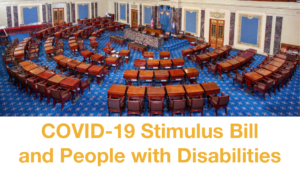 Last night Senate leaders voted unanimously to move forward on the $2 trillion-dollar emergency stimulus bill meant to help our nation respond to the COVID-19 pandemic. The bill, originally called the Coronavirus Aid, Relief, and Economic Security Act (CARES Act), now goes to the House of Representatives for a vote. If passed, then it will go to the President’s desk to become law. You can read more about the bill on the Senate Appropriations Committee website HERE.
Last night Senate leaders voted unanimously to move forward on the $2 trillion-dollar emergency stimulus bill meant to help our nation respond to the COVID-19 pandemic. The bill, originally called the Coronavirus Aid, Relief, and Economic Security Act (CARES Act), now goes to the House of Representatives for a vote. If passed, then it will go to the President’s desk to become law. You can read more about the bill on the Senate Appropriations Committee website HERE.
However, what does this mean for the millions of American living with disabilities? What provisions will specifically impact or help the disability community? What help is there for actual people with disabilities who are uniquely at-risk to the impact of the virus?
RespectAbility and a host of other disability advocacy organizations have been working around the clock to answer these questions for the past several days. Those that lobby have been fighting hard to include key provisions into the law that will help the more than 56 million Americans with disabilities.
Disability Advocates Work to Ensure That COVID-19 Stimulus Package Doesn’t Harm People with Disabilities
March 23, 2020
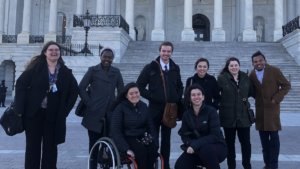 As negotiations in the United States Senate bog down around a proposed $1.6 trillion economic stimulus package, disability advocates seek allies to ensure that the government’s response to the COVID-19 pandemic helps, rather than injures, the largest minority community in America.
As negotiations in the United States Senate bog down around a proposed $1.6 trillion economic stimulus package, disability advocates seek allies to ensure that the government’s response to the COVID-19 pandemic helps, rather than injures, the largest minority community in America.
The nation is facing unprecedented social, economic and health challenges at every level of society and the 1-in-5 people with disabilities are uniquely vulnerable to the disruptive consequences of COVID-19. Whether we are talking about issues of food insecurity, access to healthcare/testing, switching to telework, or life-or-death medical decisions, the disability community is deeply impacted by these events.
Disabled Americans Demand Hospitals Aren’t Pushed into Medical Rationing
March 22, 2020
People with preexisting medical conditions urge others to heed CDC guidance, for suppliers to ramp up medical supplies, and for medical professionals to keep them alive
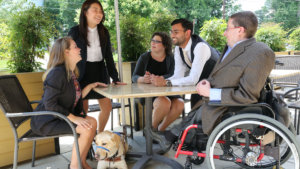 As more Americans begin to heed warnings and self-isolate in their homes, the disability advocacy nonprofit RespectAbility urges all Americans to do so without delay.
As more Americans begin to heed warnings and self-isolate in their homes, the disability advocacy nonprofit RespectAbility urges all Americans to do so without delay.
“Millions of Americans – myself included – are at high risk from the virus and from medical rationing,” said Matan Koch, who is a quadriplegic with asthma and works closely on disability issues as the director of RespectAbility’s California office. A graduate of Yale College and Harvard Law School, he knows what it means to face discrimination everywhere, including in the healthcare system.
People with Disabilities & the COVID-19 Pandemic: Key Issues & Resources
March 17, 2020
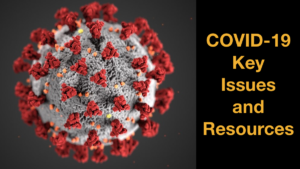 As the COVID-19 outbreak turns the world upside down, it is critically important that the global response to this crisis include people with disabilities. More than 9 million Americans are especially at risk from potentially life-threatening impacts of the virus. Moreover, fully 1-in-5 people have a learning, mental health, physical, sensory or other disability. People can be born with a disability or acquire one due to an accident, aging, gun violence or during military service.
As the COVID-19 outbreak turns the world upside down, it is critically important that the global response to this crisis include people with disabilities. More than 9 million Americans are especially at risk from potentially life-threatening impacts of the virus. Moreover, fully 1-in-5 people have a learning, mental health, physical, sensory or other disability. People can be born with a disability or acquire one due to an accident, aging, gun violence or during military service.
People with disabilities are uniquely vulnerable to the disruptive consequences of COVID-19. Whether we are talking about issues of food insecurity, access to healthcare/testing, switching to telework, or life-or-death medical decisions, people with disabilities are deeply impacted by these events. This crisis demands leadership at every level of government, every sector of civil society and from the disability community itself.
Because this is a rapidly evolving situation, RespectAbility is closely monitoring developments and collecting new resources to help impacted communities. At present, there are several critical action steps that we want to see taken to address COVID-19’s impact on people with disabilities:
Webinar: COVID-19, Disability & Mental Health
March 11, 2020
Read the webinar transcript
Download the accessible PowerPoint
Watch the webinar on YouTube with open captions
Speakers:
Moderator: Philip Kahn-Pauli
Lori Golden, Abilities Strategy Leader, Ernst & Young, LLP
Donna Meltzer, CEO, National Association of Councils on Developmental Disabilities (NACDD)
German Parodi, Co-Executive Director, Partnership for Inclusive Disaster Strategies
Shaylin Sluzalis, Co-Executive Director, Partnership for Inclusive Disaster Strategies
More Resources You Can Use
- Webinars
- Disability Training and Consulting Bureau
- African Americans
- Asian Americans and Pacific Islanders
- Communications, Marketing, and Advertising
- Education
- Employers
- Ending the School-to-Prison Pipeline
- Entertainment Professionals
- Equity and Inclusion
- Faith Inclusion
- Hispanic and Latinx
- Inclusive Philanthropy
- Job Seekers/Entrepreneurship
- LGBTQ+
- Policy Makers
- Sex Education
- Spinal Cord Injuries
- Statistics
- Veterans
- Women









